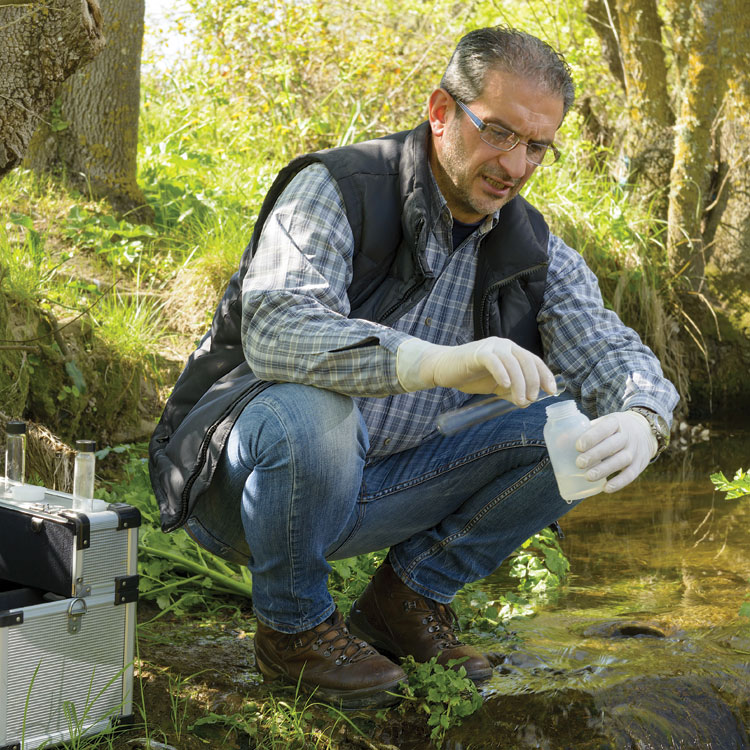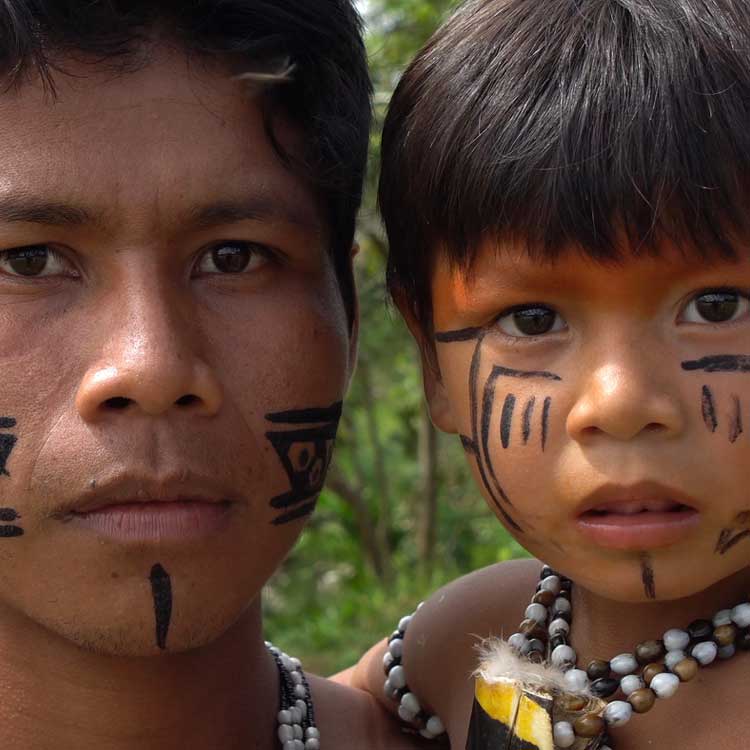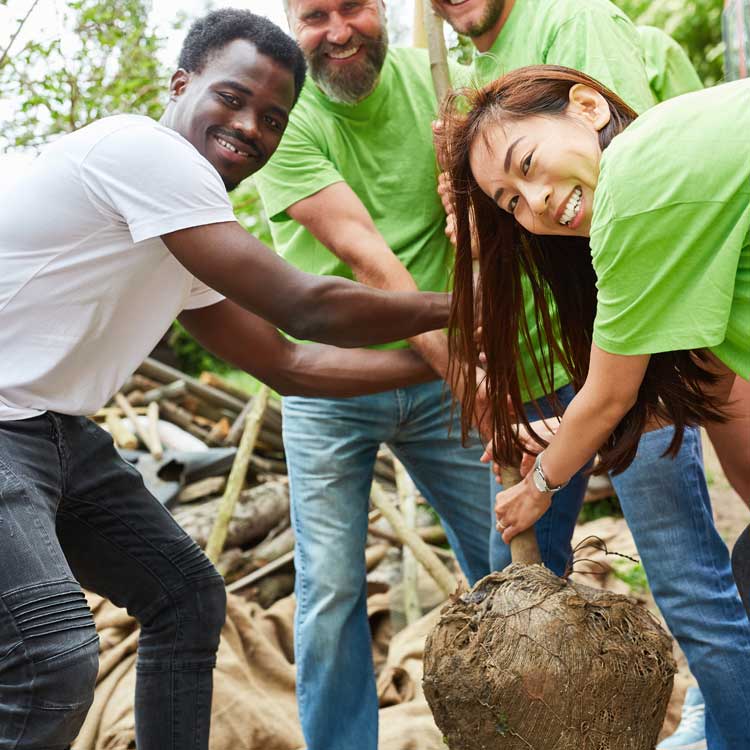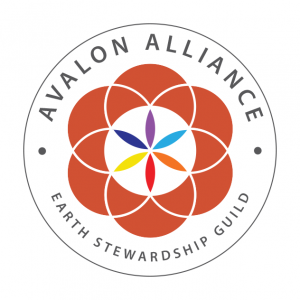
Protect the Earth & a Future for All Life
Nature is abundant and sacred, and provides countless gifts and services that sustain all life on this planet. However, humanity continues to withdraw and degrade ecological resources from the “bank of nature” as if they were unlimited assets, with little regard for replacement or restoration. Governments, industry and financial institutions must urgently remedy this gross imbalance by using new economic strategies like “full cost accounting”, “life cycle analysis” and “sustainability reporting” to properly valuate natural capital and assess cumulative impacts.
Governments often have vested interests in extractive industries and mega-energy projects, allowing companies to “self-regulate” without clear policies or enforcement of sustainable practices. Citizens can no longer afford continued exploitation of forests, minerals, water, and other natural resources, without regard for the communities of life that depend on them. For example, the Pembina Institute estimated that the Credit River Watershed in Ontario provides at least $371 million per year in “ecological services” to area residents. While nature is fundamentally priceless, financial recognition and appreciation of life support systems is a good start. Some municipal and indigenous territories and countries like New Zealand, India and Ecuador are starting to give legal standing to nature: sacred rivers, forests and mountains have now been granted “personhood”, “integral respect” and “rights to be restored”.
These financial and legal changes have been a long time coming, and much more needs to be done. Through Avalon Stewardship™ our expanded concept of “community” includes the natural elements, distinct ecosystems, plant and animal species with whom we live in profound interconnection and kinship. We have effective assessment, planning and management strategies for establishing natural parks, biosphere reserves, multiple use protected areas, and blue-green corridors that allow wildlife to move without human interference. We help resource-dependent communities diversify into the emerging green economy, and become more resilient with value-added local production and circular efficiencies. Our projects also incorporate the multifunctional benefits of ecological systems into built infrastructure and working landscapes. In the words of forester and inventor Viktor Schauberger, “observe and copy Nature, this is the path we must urgently rediscover”.
" Diversity creates harmony, and harmony creates beauty, balance, bounty and peace in nature and society, in agriculture and culture, in science and in politics... When you are doing the right things for the earth, she gives you great company. "
- Dr. Vandana Shiva, Scientist and Environmental Activist
Regenerative Stewardship Solutions

Avalon will work with resource sector clients, watershed management authorities and public-private partners in adopting new economic strategies to properly valuate natural assets and assess the full cost and impacts of industrial activities. We can assist in creating a closed-loop system that minimizes the use of resource inputs while seeking to eliminate waste, carbon emissions and other pollution outputs. So-called waste byproducts can become recovered resources for another industrial process, or as regenerative resources for nature.
Nature has inherent intelligence, power and resilience. Maintaining the many benefits of biodiversity, and the integrity of mature regional ecosystems, should be high priority in natural resources conservation and development. Avalon has expertise in the establishment of parks and protected areas, both locally and internationally. We have strategies to ensure that eco-tourism becomes a positive force in a region, rather than degrade the natural attractions people come to see.
Avalon also advances sustainable land use planning to balance the needs of human settlements and agricultural production with sufficient habitat for other species. We practice “biophilic” design and utilize our own core eco-technologies such as Avalon BioMinerals, New Energy and Ecological Landscape Utility Systems to rebuild soil, reclaim water, generate power and restore degraded landscapes.
Thus, regenerative stewardship initiatives can include:
- comprehensive land assessment and multiple use zone mapping
- green design and technologies for facilities and infrastructure
- adoption of best industry practices and innovative pilot projects
- watershed forest, stream and wildlife restoration efforts
- sensitive marine environments clean up and conservation
- bio-remediation of contaminated sites (soil, water, air)
- wildfire hazard mitigation through protecting and restoring forests
- establishing pollinator pathways and migratory animal corridors
- managing tourism and recreational impacts in parks development
- community participation in habitat protection and stewardship activities
Indigenous & Nomadic Leadership Initiative
According to the Indigenous World publication for 2018, many indigenous peoples are meeting the highest ever recorded levels of racism and violence. Their collective rights to land, territories and resources in countries around the world are at the heart of these socio-economic and environmental conflicts. Multinational extractive industries and dominant state interests have either dislocated these peoples from their ancestral homelands or forced them to actively defend their remaining lands. Moreover, conventional mining, ranching and logging, as well as mega-infrastructure projects, often create devastating impacts on their communities. Climate change also adds to their vulnerability.
The Avalon Alliance is deeply concerned about these continuing conflicts and violations of the UN Declaration on the Rights of Indigenous Peoples. Traditional nomadic peoples are also threatened, without secure and appropriates places to establish their seasonal settlements and graze their livestock. Nation states and their dominant populations and industries must respect the sustainable livelihoods of indigenous and nomadic peoples, as well as their rights to maintain their distinct cultures, languages and spirituality. Traditional indigenous territories hold most of the world’s remaining biodiversity, and their botanical knowledge and intimate understanding of land and animals are invaluable to humanity.
Mindful of the historical impacts of colonialism, the spirit of “truth and reconciliation” must guide partnerships with indigenous peoples. Avalon Alliance would be pleased to serve or partner with First Nations, Inuit and Metis communities in Canada, as well as indigenous and nomadic peoples in other countries.
The economic benefits of regional development must be fairly distributed, so that indigenous and nomadic peoples can enjoy self-determination and a secure, abundant future for their families. Some groups are already achieving leadership on the world stage as skilled caretakers and dedicated guardians of their sacred lands and waters. Avalon will respectfully engage indigenous and nomadic peoples in sustainable community development, eco-cultural tourism and environmental stewardship initiatives, and help create meaningful employment, youth training and elder teaching opportunities.

Volunteer Member Stewardship Brigade

Community land and water resources have increasingly been under management by industry and government, leaving local citizens out of decision-making and restoration activities that affect their future. Avalon will create opportunities for general community members to participate in volunteer efforts to restore degraded natural areas, by planting new trees, building fish spawning stream beds, cleaning up trails, removing plastic waste from beaches, and other activities.
Our Stewardship Brigade will first focus on improving the environment in the vicinity of Scenic Canyon Regional Park and the South Slopes area that was affected by the 2003 Kelowna wildfire. We also invite School District #23, Okanagan College, UBC-O, and other progressive institutions or agencies to collaborate with us on these projects.
Our Avalon community members are also welcome to propose additional initiatives for future stewardship efforts. As Avalon chapters grow in various parts of the world, the Stewardship Brigade will become a collective force of grassroots environmental renewal, aligning with other efforts like the Extinction Rebellion movement. Avalon volunteer stewardship projects may include professional, academic and indigenous guidance for technical and cultural aspects.
If you are a government or indigenous agency, resource development industry, watershed management district, or landowner with substantial natural assets that need protection or restoration, please contact us for professional services and/or volunteer support.

Earth Stewardship Guild
Avalon’s Earth Stewardship guild will be comprised of natural resource developers, biologists, ecologists, landscape planners, regional watershed managers, indigenous and nomadic knowledge-keepers, park planners, conservationists, fisheries and forestry experts, permaculture practitioners and others that demonstrate leadership in this field. Avalon offers environmental restoration and sustainable development project opportunities, as well as professional development and the influence of association to do good for restoring the planet.